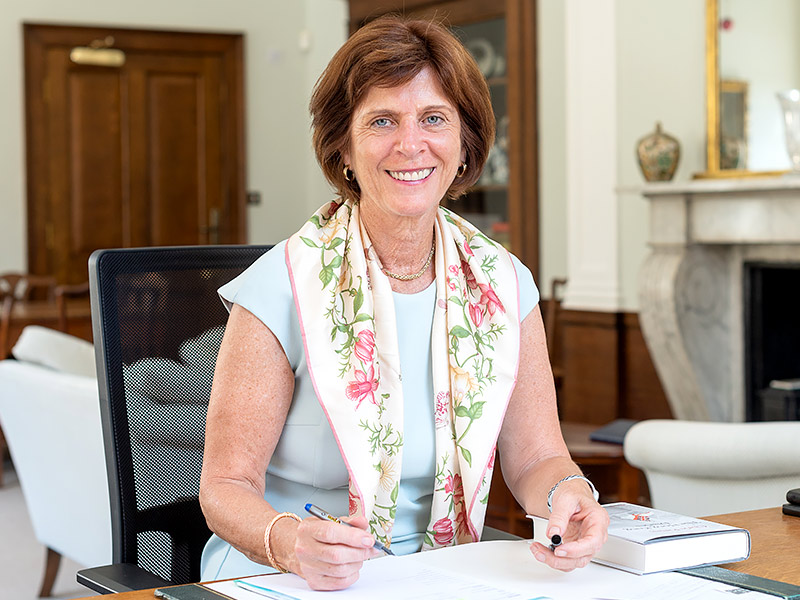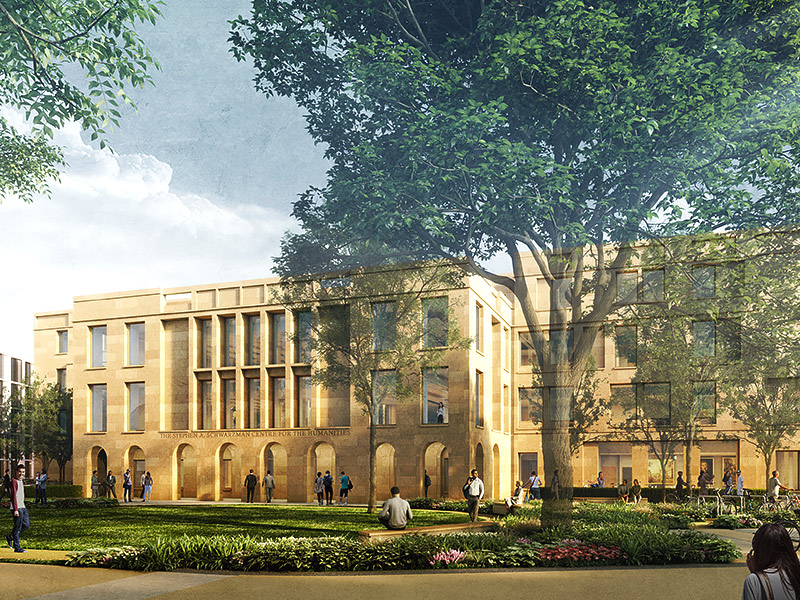Providing Oxford’s margin of excellence
As her seven-year term as Vice-Chancellor comes to an end, Professor Dame Louise Richardson reflects on the substantial difference philanthropy makes to the life and work of the University.
‘We often think of philanthropy as something new that’s been imposed on us or as a necessary evil occasioned by the times, but nothing could be further from the truth,’ says Professor Dame Louise Richardson, Vice-Chancellor of the University of Oxford. ‘One has only to look around these fabulous buildings – the Clarendon Building, the Divinity School, so many of the colleges – they were all built because of generous donors and philanthropists. Philanthropy is in our blood.’
Donors have always had a crucial role to play at Oxford and their contributions have only grown in significance under Professor Richardson’s leadership. During her tenure as Vice-Chancellor, which began in 2016 and draws to a close at the end of 2022, the University has received a series of landmark gifts, including its largest single donation since the Renaissance. In the 2021/22 academic year more than £249 million was raised in new gifts and pledges, overtaking 2020/21 to become the second most successful year for philanthropy at the University.
‘One of the first goals I set myself when I arrived at Oxford was to diversify our sources of revenue,’ reflects Professor Richardson. ‘We live in a globally competitive environment: we’re competing against universities in America, which have far bigger endowments than we have; we’re competing against universities in Asia, where governments are investing far more heavily than ours is. There aren’t many certainties in the world, but I think one of them is that the public funding of universities, in this country anyway, is only likely to go down. So we have to be creative in devising other ways to fund ourselves.’
 Professor Dame Louise Richardson at work in her office. Photo by John Cairns
Professor Dame Louise Richardson at work in her office. Photo by John Cairns
For Professor Richardson, growing philanthropic giving has been part of an overall strategy to ensure that, ‘having attracted the finest academics and students in the world, Oxford is able to provide the best environment for them to work in.’ It sits alongside other key financial decisions she has taken during her tenure: to turn to the capital markets for investment in 2017, with the issuing of a £750 million, 100-year bond (later increased to £1 billion); to forge a landmark partnership with Legal and General in 2019, which will see up to £4 billion invested in the University’s estate over ten years; and to increase investment in spinouts, a move that will not only translate Oxford research for the betterment of society, but also generate essential revenue for the University.
As well as working to shore up Oxford’s financial footing, another of Professor Richardson’s early goals as Vice-Chancellor was to diversify the composition of its student body. Donor-supported access programmes, such as UNIQ, Oxplore and the newly announced Astrophoria Foundation Year, as well as philanthropically funded scholarships and awards, are helping Oxford to make significant progress on this front. Over the previous five years, the proportion of students attending Oxford from state schools rose from 58% to 68%, those identifying as Black and Minority Ethnic rose from 18% to 25%, and those from the most socio-economically disadvantaged areas rose from 11% to 23%.
‘Donors have been absolutely extraordinary in their generosity in helping kids from deprived backgrounds and non-traditional backgrounds come to Oxford, and I take enormous pride in the steps that we’ve taken in my tenure in that regard,’ says Professor Richardson. ‘We have terrific University-wide programmes like Crankstart and the Reuben Scholarship Programme, but we also have alumni who have wanted to ensure that their own college was at the forefront of this movement. Without a shadow of a doubt, we could not have made these changes without the support of generous donors.’
 Proposed design for the north exterior of the Schwarzman Centre © Hopkins Architects / University of Oxford
Proposed design for the north exterior of the Schwarzman Centre © Hopkins Architects / University of Oxford
The generosity of philanthropists has also played a key role in ensuring that Oxford continues to produce world-leading research for the benefit of wider society. In 2021 the University received a £100 million gift from INEOS to establish a new research centre focused on antimicrobial resistance. ‘It is a major public health crisis waiting to happen, and unless we intervene it will happen in fairly short order,’ says Professor Richardson. INEOS’ gift was the second largest given to the University in modern history, following Stephen A Schwarzman’s £150 million (later increased to £175 million) donation in 2019. Mr Schwarzman’s support is enabling the creation of a new home for the humanities in Oxford – ‘an extraordinary gift, and such an exciting project,’ the Vice-Chancellor adds.
The past couple of years have also seen generous philanthropic support for the University’s COVID-19 work, as well as the creation of numerous donor-funded research institutes in fields as varied as nanoscience discovery, applied data science, pandemic sciences, and regenerative and developmental medicine. Despite major global economic uncertainty caused by the pandemic, it is clear that philanthropists are increasingly seeing Oxford as a good place to invest. The reason? ‘I think it’s relatively simple,’ says Professor Richardson. ‘It’s the calibre of the work that we do here.’
‘Some of my most enjoyable and gratifying relationships have been with people who hitherto haven’t really been involved with the University, and who are just attracted by the extraordinary work that our academics do here and want to help out’
Looking to the future, Professor Richardson believes that donor support will only become more important to Oxford with each passing year. ‘We’re competing for the top academics, for the top students, and equipment for scientists is very expensive. The kind of education we offer here – the tutorial system – is extremely expensive, which is why so few places in the world actually offer it. And in order to keep it going, we will need philanthropy.’
She singles out two areas of the University’s work where future philanthropic investment would be particularly impactful: computer science and climate change research. On the latter, the Vice-Chancellor notes: ‘It’s a field where we’ve had some investment but could have a great deal more. Again, another foreseeable major crisis heading our way for which we are not yet prepared. We have introduced a sustainability strategy for the University and that will change our internal behaviour, but it’s not going to change the global crisis – it’s only research by academics that has any hope of doing that.’
Reflecting on her involvement in philanthropy over the past seven years, Professor Richardson is sanguine. ‘I enjoy it immensely,’ she says. ‘I think it’s a huge amount of fun. I really enjoy meeting philanthropists and trying to persuade them of the importance and enduring value of what we do.’ With this in mind, her advice for Oxford’s next Vice-Chancellor, Professor Irene Tracey, is not entirely surprising: ‘Do not see philanthropy as a chore, but one of the most enjoyable aspects of this role.’
Support the Vice Chancellor’s Fund